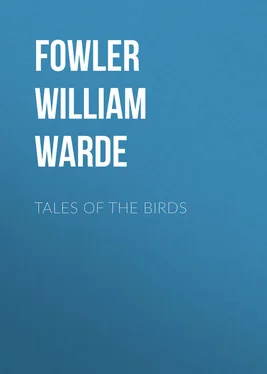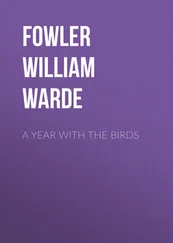William Fowler - Tales of the birds
Здесь есть возможность читать онлайн «William Fowler - Tales of the birds» — ознакомительный отрывок электронной книги совершенно бесплатно, а после прочтения отрывка купить полную версию. В некоторых случаях можно слушать аудио, скачать через торрент в формате fb2 и присутствует краткое содержание. Жанр: foreign_antique, foreign_prose, на английском языке. Описание произведения, (предисловие) а так же отзывы посетителей доступны на портале библиотеки ЛибКат.
- Название:Tales of the birds
- Автор:
- Жанр:
- Год:неизвестен
- ISBN:нет данных
- Рейтинг книги:3 / 5. Голосов: 1
-
Избранное:Добавить в избранное
- Отзывы:
-
Ваша оценка:
- 60
- 1
- 2
- 3
- 4
- 5
Tales of the birds: краткое содержание, описание и аннотация
Предлагаем к чтению аннотацию, описание, краткое содержание или предисловие (зависит от того, что написал сам автор книги «Tales of the birds»). Если вы не нашли необходимую информацию о книге — напишите в комментариях, мы постараемся отыскать её.
Tales of the birds — читать онлайн ознакомительный отрывок
Ниже представлен текст книги, разбитый по страницам. Система сохранения места последней прочитанной страницы, позволяет с удобством читать онлайн бесплатно книгу «Tales of the birds», без необходимости каждый раз заново искать на чём Вы остановились. Поставьте закладку, и сможете в любой момент перейти на страницу, на которой закончили чтение.
Интервал:
Закладка:
“Chak-chak! Chak-chak!” cried Feltie, suddenly finding his voice: “the storm is over, the fields will be soft again, the worms will come to the surface, and perhaps the sun will shine again soon! Chak-chak!”
His voice was answered feebly from a distance. Then over a hedge came half-a-dozen fieldfares, flying weakly, as he had done the day before. He joined them, and they gave him welcome, and told him how they too had gone southwards, a brave band of fifteen, of whom only six were now alive; how they had gone on and on till they had reached a stormy sea which they were too weak to cross; and how they had turned back again in despair, and were now returning northwards.
Feltie told them his story too; and then the seven set out on their journey; and in the afternoon the sun shone warmly out of the rainy clouds, the lark rose in the air and sang, the robins sat on moist twigs and cheered them with a strain as they passed; the streams rose, full of melting snow, and rushed over their banks into the meadows, moistening them and making them soft and pleasant to the searching bills of hungry birds: the air was soft, wet, and delicious, and in the fields they heard the bleating of the young lambs, and the calls of neighbouring parties of fieldfares and redwings.
At last when they neared the familiar spot which Feltie had left but a few days before, he bade farewell to his fellow-travellers and turned with a beating heart in the direction of the well-known elm-trees, standing in the flat meadows where the stream wound here and there under its brambly archway.
His loud “chak-chak” was answered: there were some old friends there still. There was Jill: and there too was Jack: they had saved their lives, then, by staying in the friendly park among the thorn-trees. But that terrible storm had done its work upon the little company: more than half were still missing, and Feltie himself was almost the last straggler to arrive. Many an adventure had to be narrated, and many a story of struggle for life and death; but there was none so thrilling as the winter’s tale that Feltie had to tell, and no loss so sadly to be bewailed as the death of the brilliant Cocktail in the gorse on the dreary frozen down.
OUT OF TUNE
“Spirits are not finely touched
But to fine issues.”
In a certain manufacturing town, of no great size, there lived a musician. For the most part he gained his living by playing at concerts and giving lessons; but he was young, ardent, and clever, and he had always nursed a hope that he might one day be a great composer. He felt a soul of music within him, that wanted to come out and express itself. But, though he had had a complete training in composition, and had written much music and published a little, no one took any notice of what he composed; it was too good to sell well (so he used to say, and perhaps it was true), and he had never had a chance of having any of his larger works performed in public. And he began to get rather irritable and impatient, so that his wife was sometimes at her wits’ end to know how to cheer him up and set him to work once more with a good heart.
Great was the poor man’s delight when one day a letter arrived from the town clerk, to tell him that on the approaching visit of the Prince of Wales to open the new Town Hall, a grand concert was to be given, in which works by natives of the town were to be performed; and that he was invited to write a short cantata for voices and orchestra. A liberal sum was to be paid him, and he was to train his own choir, to have the best artists from London to help him, and to conduct his composition himself. The news put him in such a state of high spirits that now the prudent wife was obliged to pour a little cold water on his ambition, and tell him that he must not expect too much success all at once. But she made him comfortable in their little parlour, and kept the neighbours from breaking in upon his work; and for some time the cantata went on at a flowing pace, until nearly half of it was done.
After a while however the musician’s brain began to rebel against being kept in all day hard at work, and to refuse to keep quiet and rest in soothing sleep at night. It said as plainly as possible – “If you will go on driving me in harness all day long, I shall be obliged to fidget at night, and what is more, it is quite impossible for me to do such good work in the day as I used to. So take your choice: either you must give me repose sometimes, or I must cease to be able to find you beautiful melodies, and to show you how to treat them to the best advantage.” But the musician did not know that his brain was complaining in this way, though his wife heard it quite well; and he went on driving it harder than ever, whipping it up and spurring it on, though it had hardly any strength left to pull the cantata along with it. And all this time he was shutting himself away from his friends, who used formerly to come often and refresh him with a friendly chat in the evenings; he refused to go with his wife and visit the very poor people whom they had been in the habit of comforting out of their slender store; he lost his temper several times with his pupils, and one day boxed a boy’s ears for playing a wrong note twice over, so that the father threatened to summon him before the magistrates and have him fined for assault; and his wife began at last to fear that his stroke of good luck had done him more harm than good.
One morning he got up after a restless night, in which his poor brain had been complaining as usual without being taken any notice of, and settled himself down in the parlour after breakfast with the cantata, feeling worried and tired both in his body and mind. With great labour and trouble he finished the last chorus of his first part, and uttered a sigh of relief. The next thing to be done was to write the first piece of the second part, which was to be an air for a single voice, and was to be sung at the concert by one of the best singers in the country. All the rest of the cantata had been thought out carefully before he began to write; but this song, for which beautiful words were chosen from an old poet, had never worked itself out in his brain so as to satisfy him. And now the poor brain was called upon for inspiration, just at a time when it was hardly fit even to do clerk’s work.
He tried to spur it up with a pipe of tobacco, but not a bit would it budge. Then he took a dose of sal volatile ; but the effect of it only lasted a few minutes, and then he felt even more stupid than before. Then he opened the window and looked out into their little back-garden, just as a gleam of sunshine shot down through a murky sky. This made him feel a little better, and he returned to his desk, and sat for a few moments looking at the words which he was to set to music, feeling almost as if he were now going to make a little way. But the sunshine had also made the canary in the window feel a little warm-hearted, and it burst out into such a career of song, that the room seemed to be echoing all over with its strains. And all his own music fled at once out of the distracted composer’s head.
“You little noisy fiend!” he cried angrily, “putting in your miserable little twopenny pipe, when a poor human artist is struggling to sing. Don’t you know, you little wretch, that art is long and time is fleeting?”
He jumped up, took down the cage with an ungentle hand, and carried it into another room, where he drew a heavy shawl over it and shut the door. The canary’s song was stifled, but the musician’s song was not a bit the better for it. And after a while there came another annoyance. The house was small and not very solidly built, and though the room where he was at work did not look out on the street, any street-calls, bands, hurdy-gurdys, or such like noise-making enemies, could be heard there quite distinctly. This time it was a street-boy whistling a tune; it was not a bad tune, and it was whistled with a good heart; indeed the boy put so much energy into his performance, that he must have been in very high spirits. And why did he stop there so long? Generally they passed by, and the tails of their tunes disappeared in the distance, or they turned down the next street. But this one was clearly stopping there on purpose to annoy the composer.
Читать дальшеИнтервал:
Закладка:
Похожие книги на «Tales of the birds»
Представляем Вашему вниманию похожие книги на «Tales of the birds» списком для выбора. Мы отобрали схожую по названию и смыслу литературу в надежде предоставить читателям больше вариантов отыскать новые, интересные, ещё непрочитанные произведения.
Обсуждение, отзывы о книге «Tales of the birds» и просто собственные мнения читателей. Оставьте ваши комментарии, напишите, что Вы думаете о произведении, его смысле или главных героях. Укажите что конкретно понравилось, а что нет, и почему Вы так считаете.












